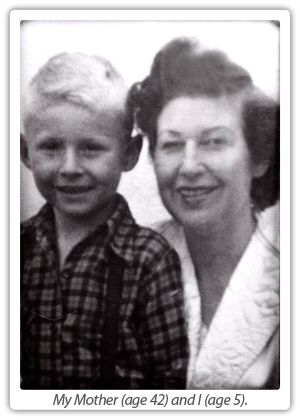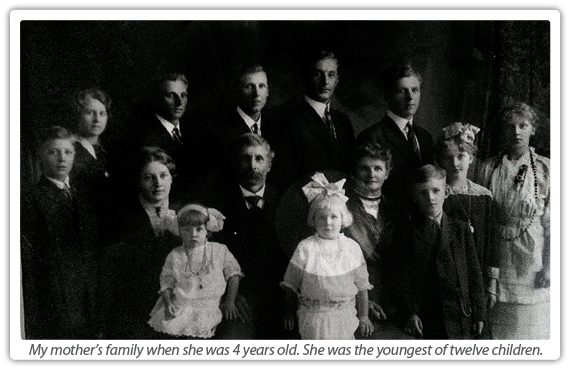
My mother informed me one Sunday afternoon in late April of 1968, that she had lymphatic cancer, and was going to have surgery. She was 57 at the time, and I was 22. I had been married for 9 months.
The surgery was not successful.
During that summer, I visited and tended to my mother on a daily basis.
Leaving
In August, I had received my first contract to teach in Utah. I told my wife that I was going to turn the contract down and stay in California to help my mother. She agreed.
My mother found out, and told me, “if you don’t sign that contract, I’m going to die right here on the spot.”
I signed the contract.
Two months later, my father called me at 3:00 a.m. and told me she had died.
We returned to California for her funeral. I had fallen into a deep sadness. Anyone, who was acquainted with us, knew that we were close.
The Funeral
During the funeral service, my wife and I were sitting on the front row.
My wife was pregnant with our first child.
During the service I tried not to cry. For some reason, I thought that if I did, I would break down all together.
My wife cried, and I can remember putting my arm around her. We were being pulled together at an especially tough time.
One of the gifts of my life is that, at a young age, my wife and I were drawn together by extraordinary circumstances. My mother had passed away, our baby was about to enter the world, we had moved out of state, and we had just started a career. There was too much bringing us together, to ever pull us apart.
Back To Utah
Shortly after the funeral, we returned to Utah. I started graduate school, while teaching. All graduate students were required to take a 1,000 question psychological test, called the MMPI. Before I could start classes, the graduate school required that one of the professors talk to me about the results of the test. Evidently, there had been a percentage of questions I did not answer. They all related to death. I was unaware that I did not answer them. It was obvious that thoughts about my mother’s passing were still deeply impacting my emotions.
Emotional Adjustment
With time, I adjusted to her passing. However, I preferred that photos of her not be put up.
But, some 35 years later, I began to see photos of her and me when I was young. My wife had put them up and had started placing photos of our young grandchildren around them.
At first, I didn’t say anything. And then, one day I said to my wife, “She died too young. It’s not fair.”
More photos of my mother began to discreetly appear. One was a photo of her family when she was four years old. She was the youngest of twelve children. The more I looked at that photo, the more recent it seemed. It’s like history getting younger as I get older.
 Death Is Outrageous
Death Is Outrageous
I now take longer looks at my mother. I am older than she was, when she died. Thus far, I have very ambivalent feelings about death. Death is final. Death is not fair to anyone. Death is outrageous. I’m not alone in this feeling. Most of us work to contribute to the possibility of living longer lives.
If things were fair, the way I see it, the personality, or the essence of a human being, wouldn’t disappear upon death.
Between the lines, I think this is the idea that drives science. Scientific discoveries are seeking to unlock mysteries, especially the mysteries of overcoming death. For example, Ray Kurzweil, in his book, The Singularity Is Near, shows the relationship between the growth of technology and the age of the human race. According to Kurzweil, slowly, but ever so surely, humans are being built to last longer. There is a direct relationship between the ever expanding amount of technology and the expanding age of the average human. Scientist Kurzweil is quite certain this will continue to grow well into the future.
Woody Allen’s comment comes to mind. “Life is about waiting around until we die.” If Kurzweil is right, that wait will continually get longer.
Kurzweil And Me
I think my life is sizing up to be an example of Kurzweil’s theories.
First, I take a small tablet, once a day, to regulate the chemical balance in my brain. I have a tendency to obsess over problems when I feel out of control. Greater emotional contentment contributes to greater longevity.
Two, colonoscopies have prevented me from developing cancerous polyps. On two different occasions, I’ve had late stage pre-cancerous polyps, which if left unattended, would have become cancerous. I could hardly believe my ears when my very, very conservative doctor said that one more “clean procedure” and he wouldn’t have to see me for four or five years. (I’m not going to tell you how old I’ll be in four or five years, but let me assure you, I will be older.)
Three, I have regular checkups with my dermatologist. He freezes off suspicious spots. And he works on removing some of my wrinkles. I continue to look older, but good enough to continue securing consulting contracts, which go out four to five years. Companies want two things from consultants: answers to their problems, and people who look decent. Answers to business problems I have, and evidently my dermatologist has helped me look decent enough. When I’m consulting, I’m content. There is joy in my life. Joy contributes to a longer life.
Four, I take medication to lessen the pain of bone spurs, when they rear up. It’s a kind of anti-inflammatory. This allows me to continue walking between 500 and 700 miles a year. My wife and I have averaged this distance for the last six years. As long as I can exercise, life extension is more likely to occur.
Five, my wife takes a tablet that regulates her blood pressure. Our doctor says, “if there is one thing we can do in medicine, it’s regulate high blood pressure.” This is good for her, and good for me too. I’m not so sure I’d have any interest in staying around if she weren’t here. We’re very tight. When times are good, we party. When times are tough, we party more. When you have a lot of partying to look forward to, you live longer.
Six, information about healthy eating is now so abundant, that I have been sold on how gross hamburger and hotdogs are. I’ve cut them out of my diet all together. I’m doing my heart a favor by doing this.
Seven, I’m sure that within the next five years, some kind of electrode therapy will be used to keep me intellectually alert, and informed if my heart, glands, etc. have unhealthy symptoms.
Eight, within ten years, tiny computer chips will be placed into my brain to keep my mind from going inert. Synthetic nylon, filled with sensors, will gradually replace my ligaments to keep me from falling apart.
The probabilities are starting to favor me living well into my seventies and maybe into my early to mid-eighties. That’s an improvement over my father who died at 48, and, of course, my mother who died at 58.
I’m doing my part, and science is doing its part. And according to Kurzweil, there will come the time that as science continues to discover healing technologies, a human will live to be 500 to 1000 years old.
This kind of person will be built and reared not to wear out. Again, according to Kurzweil, the biggest challenge will be the debate over whether this person is more computer than human.
Who cares? Just so long as the essence of one’s personality stays intact, let it roll.
But, Will It Be Fair?
At this point, however, one issue will remain to be addressed. Will life be fair?
To answer that, we will need to come to grips with all those who were unable to take advantage of life preserving technologies. Philosophically, life continually becomes more and more unfair, the larger the gap grows between the person who will live to be 1000 years old, and those, like my mother, who died prematurely.
Do I think this gap will be bridged? I think so.
Using my mother as an example, one realistic possibility involves collecting residual DNA from her (easily done: open her grave and scrape off some DNA from her body). Because resurrection technology will have grown exponentially, the ability to regenerate my mother’s DNA will be highly probable. From there, the work of resurrection becomes a purely technical matter.
Does such technology exist today? The technology used in cloning is a primitive form of resurrection technology. The ability to clone continues to advance. Ultimately, such an activity, as duplicating an organ, body part, or complete person, will be a laboratory procedure.
In addition to these extrapolations from Kurzweil’s theories, there is the power of numbers played out over time and space.
Numbers, Time, and Space
Given enough time, and given enough space, every possibility plays itself out. In other words, if there is one billion years left in the earth’s existence (actually there is more, a lot more) and given the expanse of the universe (space probably isn’t finite), every conceivable scenario will be played out. For example, if there is only one in one hundred trillion chances that my mother will be regenerated or resurrected, I will take that bet every time. With enough time and enough space, every numerical possibility takes place.
With this, I am hopeful that the universe is in the end, fair. If so, every fair possibility will come about. Thus, the unfair and untimely death of my mother will be worked through to a fair end, so that she will be permitted to live again.